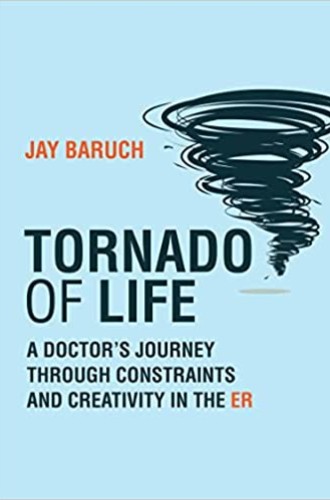The ER is a sacred space
Jay Baruch sees himself and other doctors as stewards of patients’ stories.
Most of us have seen a fair number of emergency room scenes on the big screen. They generally feature haste, split-second decisions, interpersonal tension, expensive equipment, and high drama. Many of us have also spent time in actual ERs, mostly waiting, wondering what we’re being exposed to, wishing the person three uncomfortable chairs away would quit complaining quite so loudly. Some of us have spent that time crafting imaginary op-eds about the broken health-care system.
Neither TV nor actual ERs offer perspectives that would readily lead us to the generous notion that “the ground shared between doctors and patients is sacred ground.” Jay Baruch doesn’t begin there, either. He arrives at that summary statement near the end of his rich collection of stories from years of working as an ER doctor.
Read our latest issue or browse back issues.
The focus of his stories is not public health as such, nor the state of health care. It’s not the pain, frustration, or needs of medical staff or patients. Instead, it’s the stories themselves. Doctors, he believes, are “stewards” of patients’ stories. Listening for whatever patients and distressed family members are able to tell them, they thread together patches of information, cues and clues, speculations, remembered material from medical school, and the data flashing on monitors. Whether consciously or not, they come up with what is not simply a rational solution to a problem, but a story: this is what happened, and here’s why.
Stories imply backstories. Good stories—those that invite reflective, imaginative reading—remind you of what’s not being told. Any plotline is only one thread among many, often entangled, always intersecting. Stories depend on point of view. They are partial, in two senses: they offer limited perspectives and rest on assumptions. And even “true stories” depend on fictive devices.
Baruch’s point is not simply to reaffirm what many doctor-writers and medical humanities programs have now made clear—that story making is an essential part of clinical medicine. His point is that story making is also a morally, spiritually, and medically relevant part of clinical responsibility. It is a precarious business, riddled with pitfalls, that needs to be approached with attentiveness and skill.
In one chapter, Baruch recalls how—given a couple of unchecked assumptions and small logical leaps, inadvertently plugging in speculations where no facts were available—he missed essential background information that would have placed a patient’s drug dependence in an entirely different context. Checking his assumptions, he sees in retrospect, might have allowed him not only to provide better targeted treatment but also to approach the case with more compassion and imagination.
In another chapter, Baruch reflects on the challenge of making ethical medical decisions in the contested space between an elderly father and an adult son with conflicting notions about what the patient needed. In another, he recalls, a bit abashed, hugging a homeless woman who smelled like the streets, immediately recognizing on how many counts even a compassionate hug might be considered a bad idea and a professional breach.
Baruch writes not only as an experienced physician but also as a patient. His own heart surgery and subsequent hospitalization offered him occasion to take stock of what happens in the space between telling and hearing, as well as of the vast difference that may exist between hearing and listening. “Doctors and nurses spoke to me and across me,” he writes. And he wonders how to nuance what he knows his doctors are seeing on his chart: “I wasn’t the medical trainwreck suggested by my medical history, though I recognized my problems were difficult to ignore.” He knows how cryptic charts can be and how complicated the history of one body.
The stories in this collection, not unlike those by Oliver Sacks, Atul Gawande, Perri Klass, Danielle Ofri, and a growing number of physician-writers, are teaching tales that offer hope and humane reassurance: in the midst of a struggling health-care system, there are some who understand medicine as ministry. Margaret Mohrmann’s little gem of a book by that title, Medicine as Ministry, poses this question: What would a biblically grounded approach to medical ethics look like? Mohrmann offers astute, surprising answers to that question.
Tornado of Life poses similar questions. What if professional caregivers were more aware and attentive to their role as “stewards of stories”? Would they listen differently? Would they ask more out-of-the-box questions? Would they notice different cues and clues? Would they widen the frame enough to notice the weary spouses in supporting roles? Would their capacity for compassion deepen?
With admirable humility, Baruch avoids pontificating about what his professional colleagues should do. Instead he reflects openheartedly on what he has learned from patients, from his own mistakes, and from surprising epiphanies that come from the way a patient worded a question, or from a telling metaphor, or from an information gap that opened a new path of inquiry. “An element of subjectivity enters into what we believe to be science-using and evidence-based decisions,” he insists, adding, “The imagination can lead us astray, but it can also transport us beyond what’s evident to what’s missing, beyond ‘what is’ to ‘what might be.’”
I’ve spent enough time working at the edges of medicine to know how hard it is for many in medical professions to make such acknowledgments with such candor. But meetings between doctors and patients need to happen, as one psychiatrist colleague puts it, in “intersubjective space” with an implicit acknowledgment that, to quote an ancient source, “we know in part and prophesy in part” (1 Cor. 13:9). Few of us would question the value of doctors’ medical education. But those doctors who also see the clinical encounter as a partnership and a conversation that takes place in “sacred space” may be able to be more imaginative and more spiritually attuned—and therefore more effective—healers.







